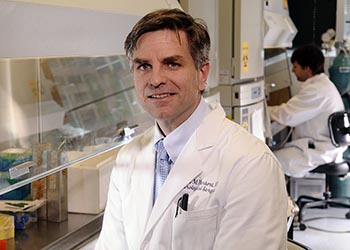The Division of Neurosurgery in the School of Medicine at the University of Alabama at Birmingham (UAB) will become the Department of Neurosurgery on Oct. 1, 2013. The Board of Trustees of the University of Alabama System approved the measure at its meeting June 14, 2013.
 James Markert, M.D., director of the neurosurgery division and the James Garber Galbraith Chair in Neurosurgery as well as a specialist in malignant gliomas, will be the inaugural chair of the department. Neurosurgery becomes the 24th academic department in the School of Medicine.
James Markert, M.D., director of the neurosurgery division and the James Garber Galbraith Chair in Neurosurgery as well as a specialist in malignant gliomas, will be the inaugural chair of the department. Neurosurgery becomes the 24th academic department in the School of Medicine.
“Dr. Markert and his faculty are truly an internationally renowned neurosurgical team, and they have made major contributions to patient care, research and education,” said Kirby I. Bland, M.D., the Fay Fletcher Kerner Professor and Chair of the Department of Surgery. “I strongly support this transition, as the decision to create this new Department of Neurosurgery will allow for growth and new synergies across many departments, as well as growth of neurosciences at University Hospital and within the UAB School of Medicine.”
Being a department raises Neurosurgery’s profile among prospective faculty recruits, organizations that rank schools of medicine and hospitals and among potential philanthropic donors, said Anupam Agarwal, M.D., interim senior vice president for Medicine and dean of the School of Medicine.
“It has become the norm at academic medical centers that neurosurgery exists within a departmental administrative structure,” Agarwal said. “This was the right time, and Dr. Markert and Dr. Bland were the right people, to make this happen at UAB. Becoming a department will help bring Neurosurgery at UAB the prominence it deserves.”
About 80 percent of academic neurosurgery programs are departments, according to a Navigant Consulting report. UAB’s neurosurgery program has grown steadily in recent years, and with 19 faculty performing more than 4,000 surgeries, and 21 residents, it was the second-largest program in the country to still be structured as a division.
Building on existing strengths in neuroscience and cancer research at UAB will be important objectives for the new department, said Markert, who is co-principal investigator with Yancey Gillespie, professor of Surgery, of a prestigious Specialized Program of Research Excellence grant from the National Cancer Institute to develop new treatments for brain tumors. Markert and Gillespie are both members of the UAB Comprehensive Cancer Center.
“Our goals for the department are straightforward,” Markert said. “We will continue to provide world-class neurosurgical care to the citizens of Alabama and the surrounding region. We will also seek to attract new energetic and talented faculty to our already stellar group in order to explore and produce new avenues of treatment; expand our research efforts so that the cutting-edge work currently underway in the brain tumor, clinical outcomes and surgical anatomy arenas can be expanded; and create new fruitful collaborations with our colleagues in other clinical and basic science departments here at UAB.”
The transition will appear seamless to patients, except that the opportunity to recruit more neurosurgeons, attract more philanthropic and research funds, Markert said, “will extend the talents and collaborations of our current faculty while allowing us to expand new research and technology to maintain our role as a leader in neurosurgical care, as well as provide trail-blazing and novel treatment approaches.
“We have been fortunate to enjoy a wonderful relationship with the Department of Surgery and will continue to do so, and we appreciate Dr. Bland’s support,” Markert said. “We would also like to thank UAB President Dr. Ray Watts, UAB Health System CEO Dr. Will Ferniany, Interim Senior Vice President and Dean of the School of Medicine Dr. Anupam Agarwal and President of the Health Services Foundation, Dr. James Bonner, for their support.”